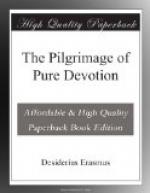is lytle light, but of ye taperes, with a fragrant
smell. Me. All these be mete for religyon.
Ogy. Ye Menedemus if you loke within you ||
wyll say that it is a seate mete for sayntes, all
thynges be so bright in gold, syluer, and precyous
stones. Me. You almost moue me to go thyther
also. Ogy. It shalnat repente you of your iornay.
Me. Spryngithe ther no holy oyle? Ogy.
I trowe you dote, that spryngythe nat but owt of the
sepulchres of sayntes, as saynt Andrew, & saynt Katere,
owr lady was nat beried. Me. I graut I sayd
amysse, but tell on your tale. Ogy. So moche
more as thay persayue youre deuocyo, so moche larger
reliques wyl thay shew to you. Me. Ye and peradueture
that thay may haue larger offerynges, as is sayd that,
many lytle offerynges makythe a heuy boxe. Ogygy.
Her chaplens be alway at hand. Me. Be thay
of ye Chanones? Ogy. No, thay be nat permyttyd
to be with her, lest that peraduenture by occasyon
of that religyon, thay shuld be plukkyd || B ij.||
frome thayr owne religyo, and whylst thay kepe that
virgyne, thay regard very lytle thayr awne virgynyte,
alonly in that inner chapell whiche is our ladyes
preuy chabre, ther standithe a certayne Chano at the
autre. Me. For what purpose? Ogy. To
receyue and kepe, that whiche is offeryd. Me.
dothe any man gyue ayenst hys wyll. Ogy. No,
but many men hathe suche a gentle shamfastnes, that
thay wyll gyue some thynge to hym that standythe by,
other thay wyll offre more largely, whiche thay wold
nat doo peraueture if that he were absent, that standithe
there. Me. You tell me of mannes affectiones,
whiche I my selffe prouyd very ofte. Ogy. Ye
trewly there be some so gyue to our blessyd lady,
that whan thay apere to put vpe thayr handes to offre,
with a pure cousyance, thay stayl that whiche other
men hathe gyuen. Me. Than || lett no man be
there, wyll nat oure Lady shote her thonderbowlte at
suche. Ogy. Wherfor shuld our lady rather doo
so, than God hymselffe, whom thay be nat affrayd to
pluke owt hys robes, & breake ye churche walles therfore.
Mene. I am in a great doubt whether I shuld,
rather maruayle apon thayre wykyd boldnes, or Goddys
great getlenes and longe sufferynge. Ogy. Apo
the Northe parte ther is a certayne gaate, but lest
that you should make a lye, it is nat of the churche,
but of the pale that compassithe a bowte the churche
yarde, and that hathe a lytle wykyt, suche as be in
great mennes gaates, that who so euer wyll entre,
must fyrst putin hys legge, nat withowt some ioperdie,
and than bowe downe hys hedde. Me. It is ioperdie
to goo thorow suche a dore, to a mannes enemye. Ogy.
So it is, the sexten dyd tell me that || B iij.||
ther was ones a knyght whiche fleeynge hys enemye,
than aprochynge, dyd ride thorow ye wykyte, and than
the wretche dispayrynge in hym selffe, apon a soden
motion, dyd commend hymselffe to ye blessyd virgyne,




